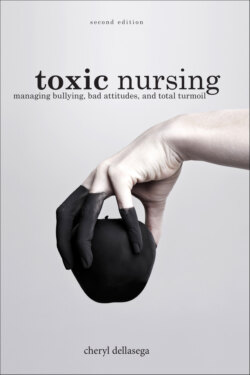Читать книгу Toxic Nursing, 2nd Ed - Cheryl Dellasega - Страница 47
На сайте Литреса книга снята с продажи.
summary
ОглавлениеAlthough many people might not think of nit-picking, fault-finding, and criticism as forms of bullying, they are, in fact, behaviors called relational aggression (RA), which uses words and behavior as weapons. RA can be linked with all kinds of adverse physical and psychological outcomes. RA has sometimes been called “female bullying” because while males tend to aggress physically (or through war), women have a long history of using more covert, relational ways to express conflict.
It is the nurse manager’s responsibility to create a climate of cooperation and respect on the unit. First, and perhaps most importantly, the nurse manager needs to role model the kind of behavior(s) employees are expected to adopt. Next, each person must recognize that he or she has the potential to act out the behaviors of being too aggressive, too passive, or standing by while another person is being bullied. Identifying specific situations that may provoke each type of behavior will help stimulate a discussion of helpful alternatives. As with most things, initiating a frank conversation on the unit about bullies, victims and silent observers is a good place to begin.
There are, however, nurses who are always on the attack, stuck in the “RA Rut.” No matter what the situation, this nurse is in aggressor mode, ready to humiliate, intimidate, or manipulate. The nurse manager should make use of careful documentation and confrontation when aggressive behaviors occur so there is a record of either improvement or continued mistreatment of peers.
Finally—just remember that we are all human. We all have good days and bad; we all have deep dark stories that cast light on why we are the way we are. We’re all dysfunctional in some way. It’s important to hold people accountable and take action to try to make things better. But, it’s also important to remember that there is usually a (relatively compelling) story behind toxic behaviors.
Fostering Cultural Change
Before taking the quiz, read the following:
The “super nurse syndrome” (Dellasega, 2009) occurs when one nurse believes he or she is automatically a better nurse and more skilled than everyone else. Are there super nurses in your hospital? On your unit? By any chance could you be a super nurse?
Answer the following questions to explore further.
Use a scale of 1–10 with 10 as “agree as much as possible” and 1 as “disagree as much as possible,” respond to the following:
• I believe that I am a very skilled nurse.
• My supervisors and other administrators consider me a good nurse.
• I am the best nurse in my organization.
• The feedback I get from my coworkers about my nursing abilities makes me feel as confident as possible.
• I am more skilled than most of my coworkers.
These questions are meant to prompt reflection on how you view your own competencies in comparison to those of your colleagues. You could also use them in a meeting of either colleagues or staff and start a dialogue on the “super nurse syndrome.”
This is an unvalidated quiz meant to prompt self-assessment and reflection. Once you have rated each item, add your score. If you got a high score on items 1, 3, and 5, you may be projecting a super nurse persona and not recognize it—or you may truly be a confident and skilled nurse. Scoring high on items 2 and 4 could mean you feel a need for external validation of your skills.
Look at the items individually and determine whether a high score on one or more individual items aligns with feedback you have received.
